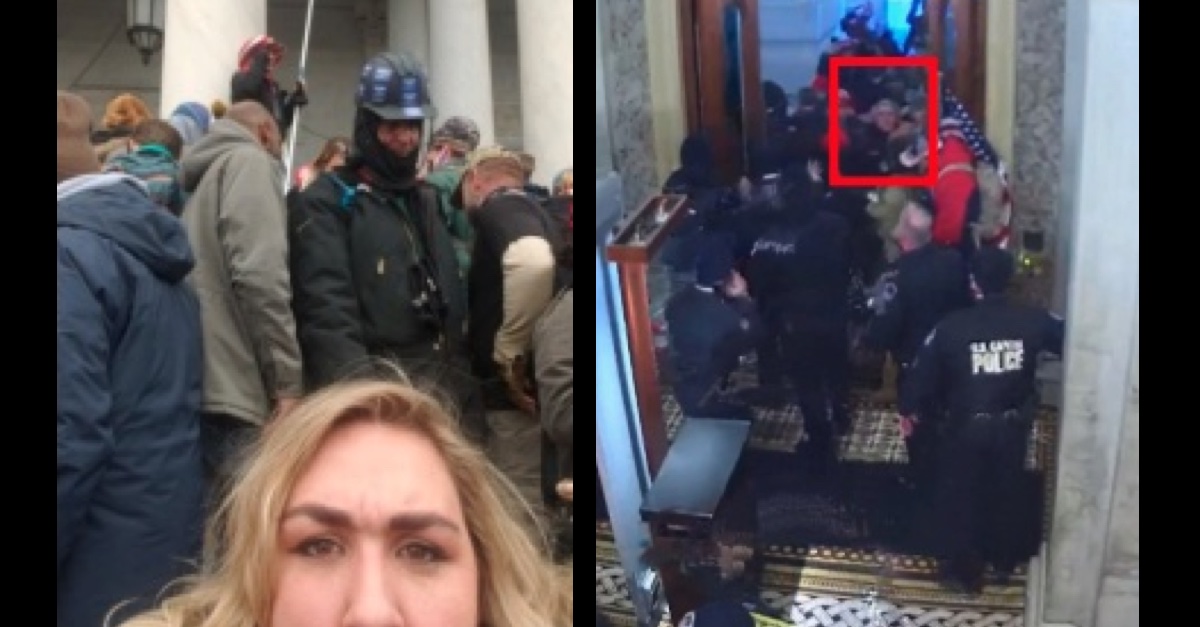
Brittiany Dillon at the US Capitol Building on Jan. 6 2021 / images via U.S. Department of Justice
A woman who texted that she “fought hard” to reach the U.S. Capitol building has been sentenced to three years of probation and two months of home detention. Her sentencing judge remarked that she was “clearly anticipating violence” when she came to Washington, D.C. on Jan. 6.
Brittiany Dillon pleaded guilty in July to the misdemeanor charge of disorderly conduct in a Capitol building.
Dillon, who said in text messages that she had “fought hard” to try to get into the Capitol building before eventually being held off by riot control officers, had also been charged with knowingly entering or remaining in a restricted building or grounds, as well as violent entry and disorderly conduct on Capitol grounds.
At Thursday’s hearing, U.S. District Judge Dabney Friedrich—a Donald Trump appointee—said that although Dillon didn’t actually cross the threshold into the Capitol building that day, she was “clearly willing and interested in becoming part of that violence” that took place.
“Ms. Dillon was clearly anticipating violence when she arrived at the Capitol or D.C. on Jan. 6,” Friedrich said. “She was also part of the initial crowd that tried to enter the building. She seemed intent on if not herself, supporting those who were trying to halt the certification of the electoral college vote.”
Although it is unclear whether Dillon had physical contact with law enforcement on the steps of the Capitol, “she was very much engaged, whether she physically assaulted them or not,” Friedrich said.
Prosecutors had asked for a sentence of three years of probation, three months of home detention, and 60 hours of community service.
Dillon, who had previously expressed skepticism over Maryland’s response to the coronavirus pandemic, attended the sentencing hearing via video because she wasn’t vaccinated “because of religious beliefs and other reasons,” her attorney Thomas Abbenante said.
During the hearing, Friedrich expressed concern that statements Dillon made to law enforcement even after she changed her plea to guilty were a cause for concern.
According to the government’s sentencing memo, Dillon told law enforcement that she thought someone was going to kill Trump, and that she needed to protest “or else the United States would end up without free speech, like China.” She had also said that she did not support violence except in extreme circumstances, such as the Revolutionary War, but that she viewed Joe Biden taking office as such an extreme circumstance.
“I don’t find the statements she made to [law enforcement] ring true in light of the text messages the government has presented,” Friedrich said. “In assessing her degree of remorse [. . .] her statements seem very much separated from reality and her own conduct. And that, too, troubles me.”
Dillon told Friedrich that she was indeed remorseful and that she was “traumatized” from the events of that day.
“That day was the worst day of my life,” Dillon said, her voice shaky and sounding, at times, near tears. “This does not line up with the rest of my life. I admit I have strong beliefs, most definitely, but what I did was inexcusable and unacceptable.”
“I am so truly sorry for my choices,” she added.
Dillon said that she doesn’t remember much of what happened when she was on the steps of the Capitol on Jan. 6.
“So much of that day comes to me in flashes, there was so much going on in my personal life and what was happening in the country,” she said. “It was so overwhelming and a lot of times, it’s hard to remember because it’s painful and traumatic.”
In her remarks, Dillon thanked the court for treating her with “dignity” and said that before Jan. 6, she had never broken the law.
“I want to continue being the person I was before Jan. 6, which was never breaking the law,” she said.
Friedrich said that Dillon had an opportunity to learn from the experience.
“There are many lawful and productive ways to channel your frustration over the government and what’s going on this country,” Friedrich told Dillon. “This one mistake doesn’t have to define you, but perhaps the way in which you respond to this mistake can define you.”
[Images via U.S. Department of Justice]